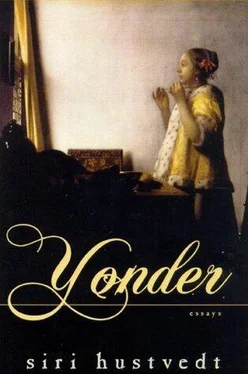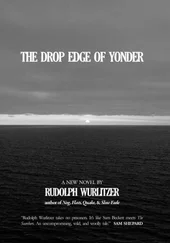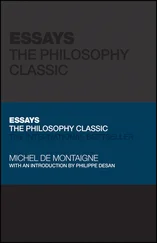And that’s why legislating desire is unwieldy. A child rushes over and kisses another child in school in New York City, and he’s nabbed by the authorities for “sexual harassment.” Maybe it was an aggressive act, a sudden lack of control that needed the teacher’s attention. Maybe the kissed child was unhappy or scared. And maybe, contrary to the myth of childish innocence, it was sexual, a burst of strange, wild feeling. I don’t know. But people, children and adults, do bump up against each other. Everywhere, all the time there are scuffles of desire. We have laws against molestation and rape. Using power and position to extract sexual favors from an unwilling employee is ugly and shouldn’t be legal. But on the other side of these crimes is a blurry terrain, a borderland of dreams and wishes. And it isn’t a landscape of sunshine only. It is a place streaked with the clouds of sadism and masochism, where peculiar objects and garments are strewn here and there, and where its inhabitants weep as often as they sigh with pleasure. And it is nothing less than amazing that we should have to be reminded of this. All around us, popular singers are crooning out their passion and bitterness on the radio. Billboards, advertisements, and television shows are playing to our erotic weaknesses twenty-four hours a day. But at the same time, there is a kind of spotty cultural amnesia in particular circles, a block-headed impulse to crush complexity and truth in the name of right-thinking.
Once when I was attending a panel discussion on the fate or the state of “the novel,” at the 92nd Street Y, because my husband had been roped into moderating this discussion, I listened to a novelist, an intelligent and good writer, berate Kafka for his depictions of women. They were bad, she said, wrongheaded. But in Kafka’s world of dreams and claustrophobia, a world of irreducible images so powerful they shake me every time I remember them, what does it mean to second-guess its genius, to edit out the women who lift their skirts for the wandering K? When I read Kafka, I am not that housemaid who presents herself to the tormented hero anyway. I am the hero, the one who takes the pleasure offered, as we all do when we sleep.
This is my call for eros, a plea that we not forget ambiguity and mystery, that in matters of the heart, we acknowledge an abiding uncertainty. I honestly think that when we are possessed by erotic magic, we don’t feel like censoring Kafka or much else, because we are living a story of exciting thresholds and irrational feeling. We are living in a secret place we make between us, a place where the real and unreal commingle. That’s where the young philosopher took the woman with the belligerent question. He brought her into a realm of the imagination and of memory, where lovers are alone speaking to each other, saying yes or no or “perhaps tomorrow,” where they play at who they are, inventing and reinventing themselves as subjects and objects; and when the woman with the question found herself there, she was silent. Maybe, just maybe, she was remembering a passionate story of her own.
1 Metaphor
The act of reading still surprises me, especially reading novels. The fact that I can look down at little symbols on a page and translate them into images and voices continues to astonish me. When I remember books, I don’t remember the words on the page. I remember what I saw and heard the way I remember the real world. Sometimes when I go back to a book, I realize that I remembered wrong. And yet, every reading is an encounter with words, nothing more and nothing less. Over the years, I have read many books. Some of them have vanished. Others have lingered in my mind and changed me forever. One of them is the last novel Charles Dickens finished, Our Mutual Friend. It is a book about the world’s secrets, about what we know and what we can’t know, about what is spoken and what is unspoken. In it I found not answers but ultimate questions. More than any other writer I have read, Dickens is close to the metaphysical strangeness of things, to living and dying, and to the desire to put all of it into words.
The novel begins at twilight. The narrator looks over the dark water of the Thames and notices a boat, but it’s hard to see in the bad light. Through the magic of omniscience, he moves closer. The boat has “no inscription,” no identifying marks whatsoever. It is nameless. In it we see a man and a girl. Suddenly a slant of light from the waning sun illuminates the craft’s bottom, “touching a rotten stain there which bore some resemblance to the outline of a muffled human form.” The secret of the book is here. The stain will generate a world of muffled human forms, because this is a story of bodies, both dead and alive, and the marks they leave on the world, and it is a story of recognition and identification, which turns out to be a very murky business indeed.
The plot in a nutshell is this: The rotting body that left its stain in the boat is soon discovered, and the papers found on it lead the authorities to identify it as John Harmon, son of a London dust mogul and heir to a fortune. But the officials are wrong, and this case of mistaken identity will turn the world of the book upside down. The Boffins, loyal servants to old Harmon, become heirs to the fortune. Silas Wegg, a sly observer of the Boffins’ new wealth, plots against them. A cash award, offered for information leading to the perpetrator of the murder, inspires Riderhood, a low-life river rat, to a deception that takes him to the offices of Eugene Wrayburn and Mortimer Lightwood, lawyers for the Harmon estate. Riderhood then accuses Gaffer Hexam, the man in the boat who found the body, of murder. This, in turn, brings the highborn Eugene Wrayburn and the lowborn Lizzie Hexam together, and their love story begins. Most important, the false identification of the body allows the real John Harmon, who has been away from home for many years, to pose as someone else, to become a spectator of his own death. He goes to live in what was once his father’s house, where he works as a secretary to Boffin and observes the beautiful but spoiled Bella Wilfer, ward to the newly flush servants and the woman to whom he has been given in his father’s will — his marriage to her being a condition of his inheritance. Another rocky courtship begins. Through social connection or simple coincidence, all the dispersed elements of the story intersect or collide: Lizzie and Bella meet. Bradley Headstone, schoolmaster to Lizzie’s brother, and Eugene Wrayburn are thrown together and become rivals for Lizzie, and in the grip of what proves to be a fatal libidinous passion for Lizzie, Headstone allies himself with Riderhood. Our Mutual Friend is a story of love, money, greed, and dying — usually by drowning.
At one time or another, almost all the book’s male characters end up dead or almost dead in the river. The cadaver dredged from the river slime turns out to be George Radfoot. When Radfoot is killed, Harmon, too, nearly drowns. Gaffer Hexam eventually drowns as he goes about his business of robbing the bloated bodies he dredges up from the Thames. Riderhood comes close to drowning once, before he finally goes under with Bradley Headstone. Eugene Wrayburn is rescued from a watery grave by Lizzie Hexam. Jenny Wren, Lizzie’s friend, loses her grandfather to the river — an old man, dragged from the depths by Hexam, still wearing his nightshirt.
In the book, drowning and near drowning have a nearly cyclical rhythm that is echoed by events on dry land. A man goes under and vanishes forever or resurfaces as an unrecognizable body. The story the book tells is a movement between what is there and what is not there, a flux from the seen to the unseen. You can’t have presence without absence, and language itself is born from this rhythm. The words can speak to what is missing. Where do words live if not in a zone between presence and absence?
Читать дальше












